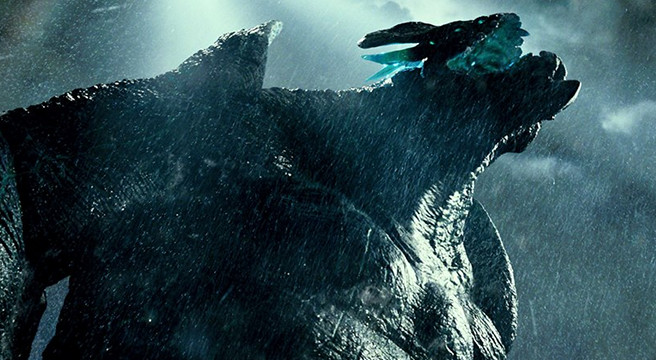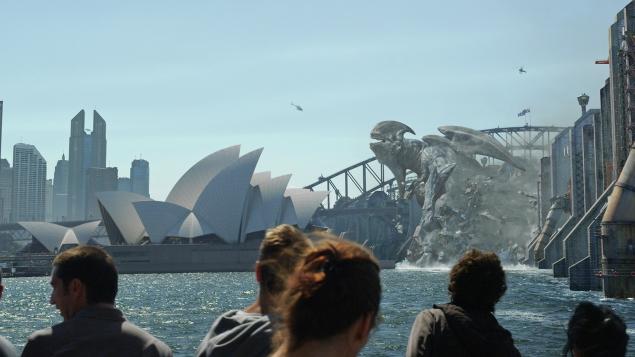CRIMSON PEAK
 Sunday, October 18, 2015 at 9:22AM
Sunday, October 18, 2015 at 9:22AM Stars: Mia Wasikowska, Tom Hiddleston, Jessica Chastain, Charlie Hunnam, Jim Beaver and Leslie Hope.
Writers: Guillermo del Toro and Matthew Robbins.
Director: Guillermo del Toro.
Rating: 2.5/5

Genre god Guillermo del Toro’s grand but grating gothic melodrama Crimson Peak is rich in indulgent style but as prone to inconsequential substance as the ghoulish spectres that sporadically manifest.
Such a shortcoming need not be the death knell for a supernatural thriller; plenty have favoured good time frights over thematic complexity. But having established a turn-of-the-century heroine in Edith Cushing (Mia Wasikowska), whose ambition to write smart horror posits her as a gender pioneer, the revered horror auteur bends to suit his favourite old-school tropes, reducing her to a shrieky ‘final-girl’ stereotype at best. At worst, she becomes a mere redemptive tool for Tom Hiddleston’s milquetoast fancy-lad, Thomas Sharpe. It is this lack of narrative ambition that reduces Crimson Peak to an uninvolving nod to horror's 'golden era', instead of the vibrant, modern retelling it could have been.
The film’s creepiest moment happens in the opening minutes, when the ghastly visage of a young Edith’s recently deceased mother returns to forewarn, “Beware of Crimson Peak”; why the maternal spirit (played del Toro regular, legendary movement artist Doug Jones) would take such a terrifying form to revisit her little girl is the first of many logical incongruities that curse the film. We next meet Edith as the well-to-do but independent young woman struggling to break free of her kindly, capitalist father, Carter (Jim Beaver), hawking her first manuscript but butting heads with chauvinist traditionalists.
Her dashing knight arrives in the form of Hiddleston’s entrepreneur who, having failed to secure Cushing’s financing, woos Edith in the wake of a family tragedy and whisks her away to his crumbling English estate, Allerdale Hall. Here, under the snarly glare of his nefarious sister Lucille Sharpe (Jessica Chastain, chewing what’s left of the decrepit home’s scenery), Edith uncovers dealings that reveal The Sharpe’s sinister past and their plans for her alarmingly truncated future.
Scripting with the usually reliable Matthew Robbins, a longtime collaborator (Mimic, 1997; Don’t Be Afraid of the Dark, 2010) and industry veteran (The Sugarland Express, 1974; *batteries not included, 1987), Del Toro structures a plot of gossamer flimsiness, clearly designed as a nod to the Giallo genre and Hammer oeuvre (note the protagonist’s surname) but barely able to inject any sense of dread into the labourious proceedings. Save the aforementioned apparition and two moments of ‘that’s more like it!’ ultra-violence, the 119-minute running time proves to be the Mexican director’s cruellest indulgence.
Del Toro the writer entirely cedes this production to del Toro the conceptual artist. From the muddy streets and mansions of Buffalo, New York, to the multi-tiered, majestic ruin that is Allerdale, del Toro’s vision is brought beautifully to life by art director Brandt Gordon (Total Recall, 2012; the soon-to-be-released Suicide Squad) and two-time Oscar-nominated production designer Thomas E Sanders (Bram Stoker’s Dracula, 1993; Saving Private Ryan, 1999). When the overripe dialogue and stodgy pace prove tiresome, there is always a great deal of artistic detail upon which the eyes can feast.
The ghostly matriarch’s foretelling comes to pass (to no one’s surprise, rest assured) when it is revealed that the locals often refer to Allerdale Hall as ‘Crimson Peak’, after the blood red clay upon which the estate is built. As winter falls and the soil swells with moisture, the grounds turn a corpulent scarlet. So, it’s just mud, that looks gory, but is not at all gruesome or sinister or even very interesting. Such a bloodless, messy foundation seems particular fitting.
It was a similarly vast but vacuous vision that left so many ambivalent towards his last effort, Pacific Rim. The director, whose one true masterpiece Pan’s Labyrinth is nearly a decade old, may find himself teetering on the edge of irrelevance in the wake of his latest.


